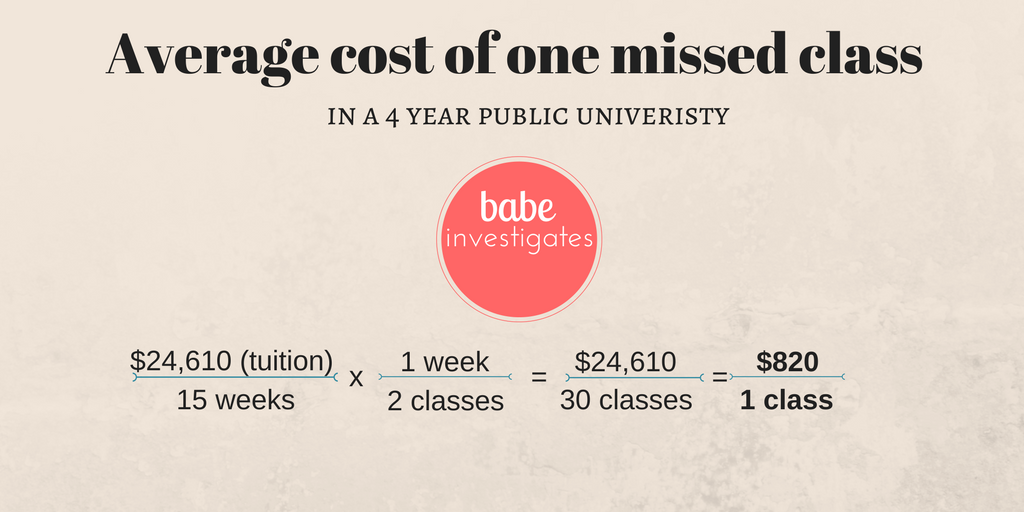
Who can actually afford to boycott work for Women’s Day?
Let’s think about what actually goes into a national strike
When I first heard about a “A Day Without Women,” I knew right away that I both would not and could not participate. It is my privilege to study at the university I’m attending and work at the job I have.
The pressure from more privileged feminists has boiled over, especially on social media, with some activist accusing those not participating of undermining the fight for women’s rights.
Not only do mindsets like these ignore huge subsets of the female population, but it excludes the fact that some of us are not privileged enough to miss a day of work or class.
As a female college student, I know how much my family are sacrificing for my education and how women didn’t always have the right to have an education — many still don’t.
Even though feminist activists have been quoted saying the boycott represents all women today, they seem to forget that some of us are proud to go to work, or literally need to in order to survive.
In a Guardian op-ed by the boycott founders, the women in charge tried to map out exactly what they hope would come of the strike:
“Let us join together on 8 March to strike, walk out, march and demonstrate. Let us use the occasion of this international day of action to be done with lean-in feminism and to build in its place a feminism for the 99%, a grassroots, anti-capitalist feminism – a feminism in solidarity with working women, their families and their allies throughout the world.”
When I read the words “working women,” I questioned if they meant ALL working women since most of us could either lose our job or a day’s worth of pay. Luckily there’s other ways to protest, but as a minority myself, most people do not know how it feels to be on their own or the need to work our asses off to prove our worth at work or at our university.
Statistic cite the fact that over 56 percent of children living under the poverty line belong to female-headed households, and minority students only get 28 percent of scholarships. For major chunks of the intersecting feminist population, opting out is well, not really an option.
Taylor Allen from Temple University, a student who must maintain her GPA and work hard as she does, explains why she doesn’t agree with the message of “A Day Without Women.”

“Essentially, I feel like women should work and be educated because why wouldn’t you utilize HALF of your population? Other than blatant sexism, it’s also counterproductive for any society to not use all of their people,” Allen said. “As someone who had to work to even have the option to pursue a higher education, telling me to not work is a direct insult to my potential. I’m well aware that I’m capable of doing incredible things.”
Heidi Orellana from Rutgers University is a sophomore Psychology student receiving no financial aid for her costly college expenses and she states why this day is harder for college students like herself.

“I feel like that’s how our society has become,” Orellana said “The most privileged people don’t have to think twice about skipping class, but for someone who is paying for their own education receiving no scholarships or financial aid–missing one day of class is like throwing away $500 dollars.”
IrThe average cost of a missed class is more expensive than what others believe.

According to College Data, College Board reports that a “moderate” college budget for an in-state public college for the 2016–2017 academic year is $24,610 and the average college semester is 15 weeks. Once we divided the amounts, we concluded that a missed class is approximately $820.
Now imagine missing one day of class.
If you ask me, skipping a class is offensive and something I do not take lightly. Some people could be privileged to take off of work or not go to class and not be penalized but there’s many of us who had to go through to hell to get where we are.
Do you really think many college students could just miss class and be OK with it? Some students can but they’re ignorant for doing so by wasting an education that many would die to have if they had the same opportunities as us in the United States.
In order for a change to truly occur, we shouldn’t just focus on a single day. If we wish to make a statement then we accomplished that with “A Day Without Women”, however if we want a change in a specific cause then we should organize ourselves amongst all women and make a bolder statement with our next large scale protest for an extended period of time.

The intentions of this boycott were, of course, great. The idea of imagining a day without women is a powerful one, but just like with the similar “A Day Without Immigrants Strike,” it fully ignores the people coordinators are trying to benefit.
Though we have the most to gain from a breakthrough in these precarious times, we also have everything to lose.
